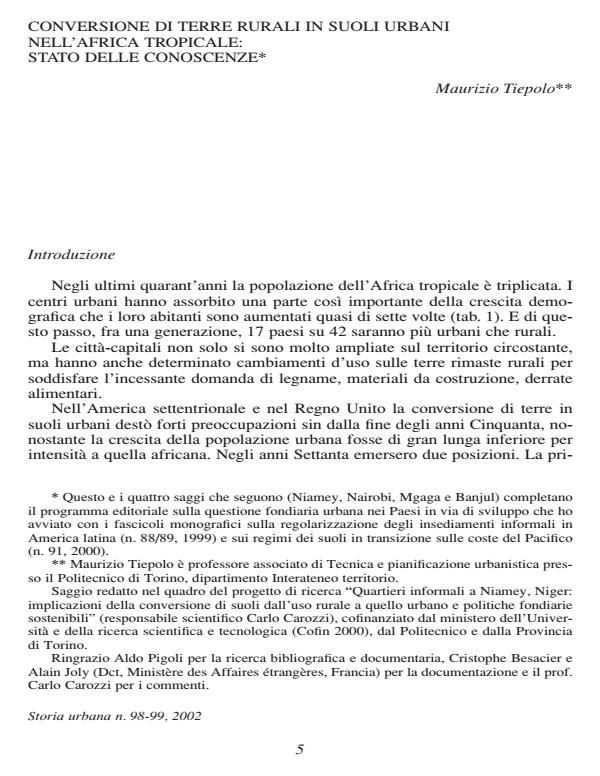Conversione di terre rurali in suoli urbani nell'Africa tropicale: stato delle conoscenze
Titolo Rivista STORIA URBANA
Autori/Curatori Maurizio Tiepolo
Anno di pubblicazione 2003 Fascicolo 2002/98-99 Lingua Italiano
Numero pagine 24 P. Dimensione file 101 KB
DOI
Il DOI è il codice a barre della proprietà intellettuale: per saperne di più
clicca qui
Qui sotto puoi vedere in anteprima la prima pagina di questo articolo.
Se questo articolo ti interessa, lo puoi acquistare (e scaricare in formato pdf) seguendo le facili indicazioni per acquistare il download credit. Acquista Download Credits per scaricare questo Articolo in formato PDF

FrancoAngeli è membro della Publishers International Linking Association, Inc (PILA)associazione indipendente e non profit per facilitare (attraverso i servizi tecnologici implementati da CrossRef.org) l’accesso degli studiosi ai contenuti digitali nelle pubblicazioni professionali e scientifiche
Over the last forty years, the urban population of Tropical Africa has increased seven-fold: more than anywhere else on the planet. To date, this intense process of urbanization has chiefly been investigated from the demographic standpoint, i.e., in terms of population growth. Conversely, little is known of urbanization’s physical component: the expansion of cities. This paper reviews the literature on rural-urban land conversion in the major capital cities of Tropical Africa, first focusing on the extent, type and methods of conversion. This is followed by an examination of conversion’s repercussions on peri-urban desertification, food insecurity, urban poverty and environmental degradation. Finally, the paper assesses the literature dealing with the urban planning efforts associated with conversion, concluding that our knowledge of its extent, type and methods is limited to a few capital cities. By contrast, the repercussions of conversion have been investigated in a much wider range of urban centers. The literature suggests a variety of measures for planning conversion. These measures, however, do not appear to be feasible without first recognizing the rights of those who possess the land (its customary owners), those who use it (the farmers) and those who work it or occupy it illegally (squatters). Without land reform, none of the measures that have been proposed for regulating land conversion can be put into practice. In this fundamental area, however, the literature on rural-urban land conversion has little to say.;
Maurizio Tiepolo, Conversione di terre rurali in suoli urbani nell'Africa tropicale: stato delle conoscenze in "STORIA URBANA " 98-99/2002, pp , DOI: